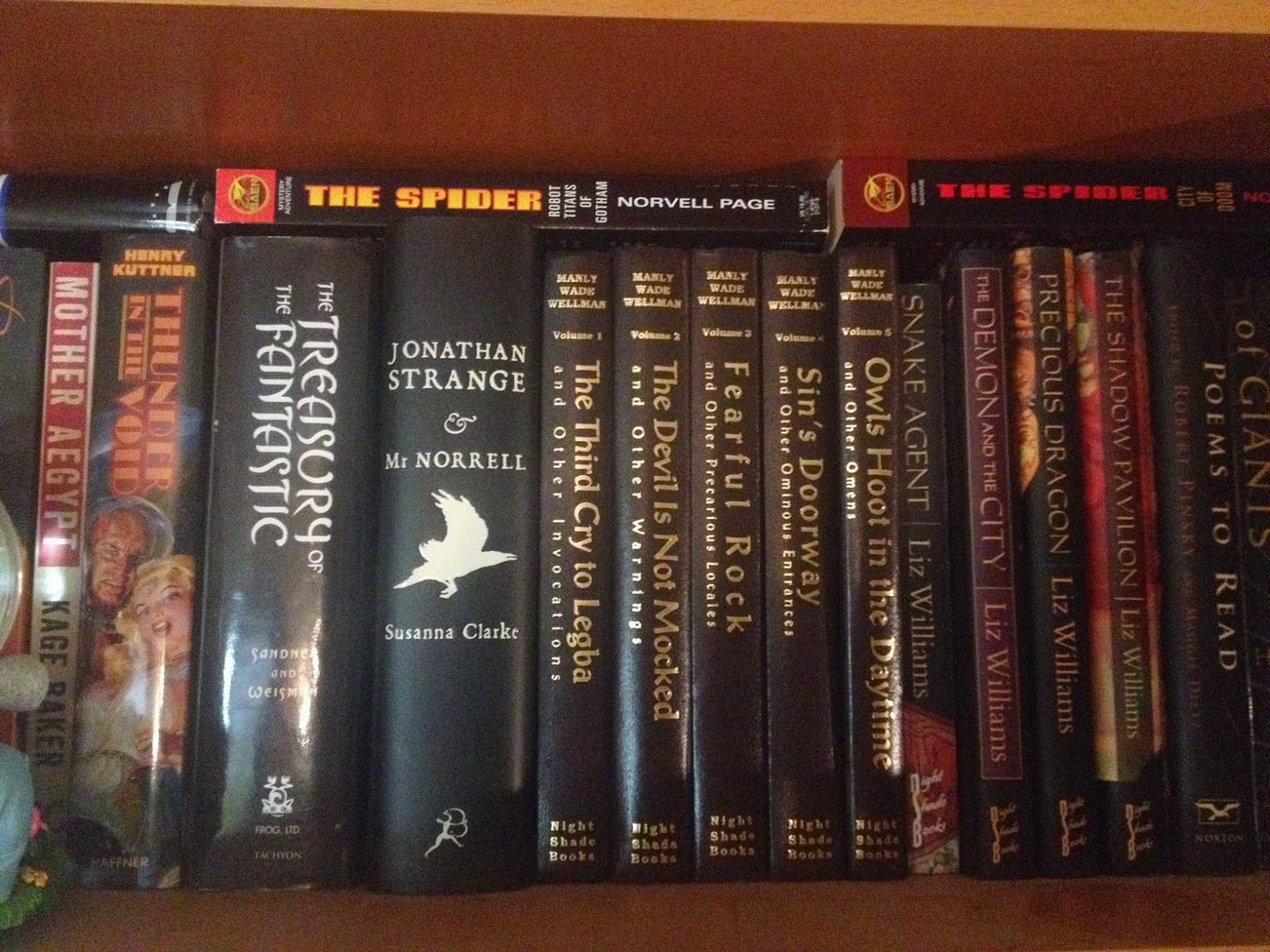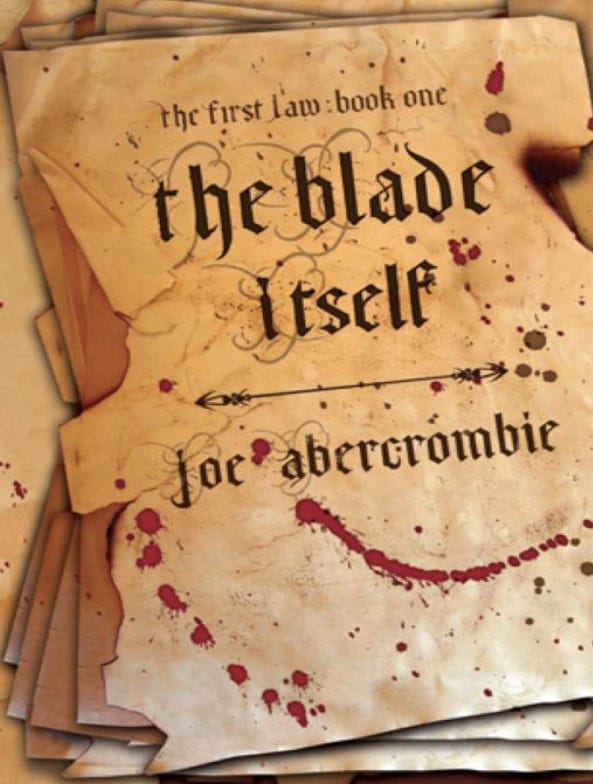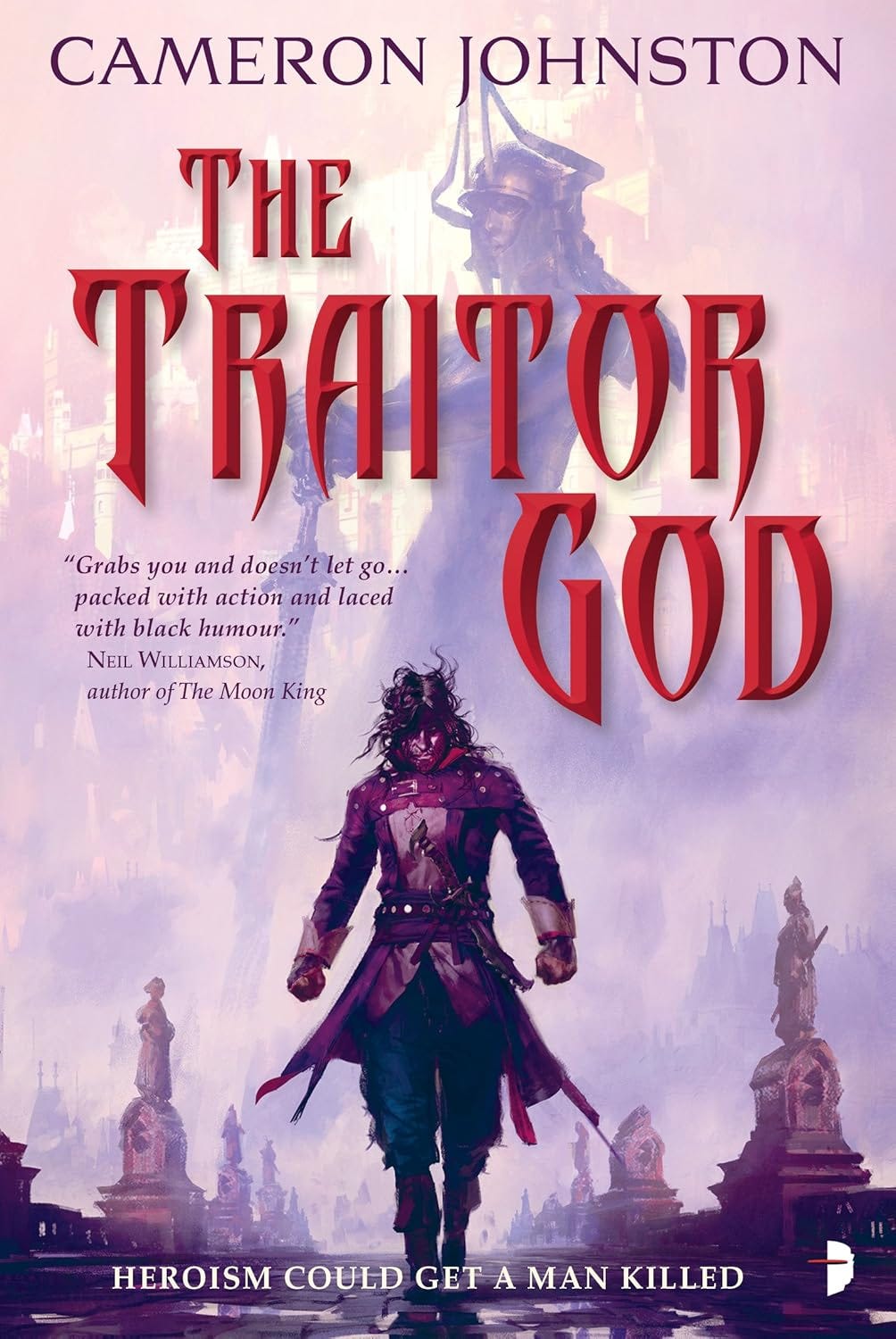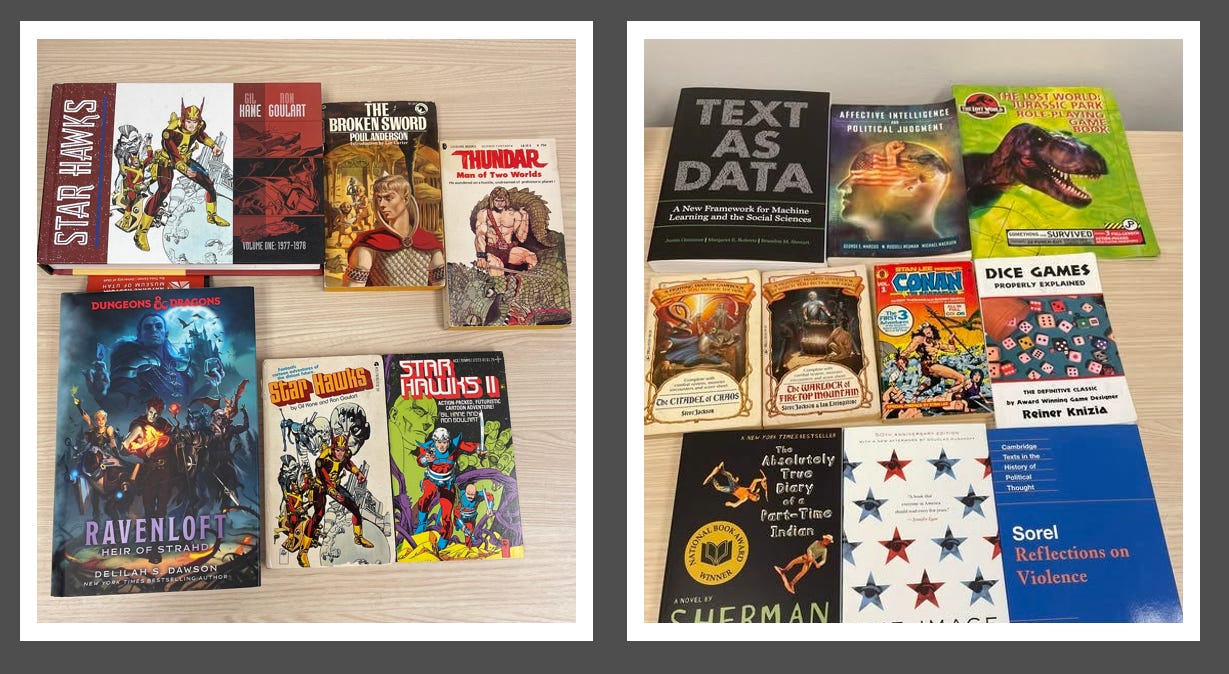Here's What I'm Reading Right Now. What Are You Reading?
Let's Get to Know One Another
One of the things I love about Substack is how it promotes conversation and community, but I think too much of my interaction happens over on Notes and not on my Newsletter entries. There’s a part of me that wishes opening up one of my past posts would be similar to the early days of social media when I would login to the Book of Faces, or My personal Space, or the Ster of Friends where I would find some meme going about asking people to share information about things they love. Sure, some of the time those were just phishing endeavors hoping you would reveal answers to your password questions, but more often they were attempts at building community.
For a while Blue Sky had those posts because it was in the early stages and behaved a bit like early Twitter. People shared where they were visiting and what they were reading, but Blue Sky eventually journeyed through Social Media’s Posts of a Thousand Phases and is now essentially Twitter in 2014, which has a certain utility but making friends isn’t a part of the dynamic. Most short form social media has gone that way and there are a couple of recent articles on social media toxicity and virality that cover it.
The first was a discussion of Dark Personality traits and Online Political Participation and among its findings were:
”Drawing on data from the United States and seven Asian countries, the findings reveal that individuals high in psychopathy and FoMO are consistently more likely to engage in online political activity. While narcissism is also linked to participation, this relationship emerges in only three of the eight countries. Conversely, higher cognitive ability is uniformly associated with lower levels of online political participation. Notably, the relationship between psychopathy and participation is stronger among individuals with lower cognitive ability in five countries, suggesting that those with both high psychopathy and low cognitive ability are the most actively involved in online political engagement.”
The second article, called “The Psychology of Virality,” discussed the underlying shared psychology that leads to negative stories being shared more often than positive ones:
”There is a clear pattern in the literature on virality (Figure 1). Most studies suggest that high arousal negative emotional expressions (e.g., hostility, moral outrage, out-group animosity, and indignant disagreement) go ‘viral’.”
Long form social media, like blogs and Substack, are more resistant to that kind of thing because they are much more curated and less focused on high arousal information. There are exceptions that occur mostly in the political space, but I’d direct you to the article on Dark Personality traits as my response to the kinds of people who are writing those. Besides, if you are doomscrolling, you can read a lot more 144 or 280 character microcomments than you can the 18 minute reads I keep sending your way.
Back in the day, I was a regular reader of the now defunct SF Signal blog and I’m still a fairly regular reader of Blackgate and DMR Books and you know I scour the Substack for genre related content. I still think that Blackgate is one of the best fandom based blogs on the internet, and I just purchased a new copy of their old print publication, but newer I’m a regular reader of Just The Axe, Ma'am, Ethan Sabatella, Rebekah King, The Power of Us, ill LYTeracy, Sherman Alexie, Matt Thompson, Castle Grief, Rediscovered Realms, Graphs about Religion, and many other newsletters. I think we are in a Golden Age (again) for people who want to read about and discuss genre fiction that is akin to the early blogosphere. I don’t know if it will last. I see the famous people squeezing in on the independent space and financializing the space in a kind of literary gentrification, but I have hope. Each week I am excited to pour through my newsletter routine to see what I learn or who shares my interests.
This newsletter continues to grow, though the rate has slowed down recently, and I’d like to engage in a “book meme” conversation with you if you are all willing.
You remember book memes?
Those are the potential phishing emails I talked about at the beginning of this post.
I’m going to share my answers to a list of 15 questions that where posted by John DeNardo on SF Signal a decade ago,
You know the drill: Copy the questions below and paste them into the comments with your answers or better yet start a “book discussion circle” newsletter post. Answer as many or as few as you’d like.
What was the last science fiction/fantasy/horror book you finished reading?
Since my daughter History and I finished The Hero of Ages earlier this year, we’ve paused our reading of the Mistborn series. The timeline jumps ahead quite a bit and there are a lot of other things we want to read together. We started Sanderson’s series because I was going through old episodes of the Geekerati Podcast and I came across an episode (from 2009) where I interviewed Brandon about his Alcatraz versus the Evil Librarians series which I eventually read as bedtime stories to my twins. In the first couple of moments of the interview, right as I’m introducing Brandon, my daughter History starts to cry because she could see me but not touch me due to a child gate being in the way. I asked History to come and listen to the moment. We laughed and decided to read some Sanderson. I’ll edit that interview and share it in the next couple of weeks. Let me know if I should keep the crying or not.
While History has gone on to reading some interesting books by one of her favorite authors, and I’ll have to play catch up on those, I have been rereading The Dragonlance Chronicles. They have just been rereleased in a beautiful edition and I loved them as a kid. Yes, they are derivative, but they are also relatively unique in modern fantasy for their incorporation of religious themes and having the gods be real. In this case, the underlying theology is influenced by the faith of one of the authors. Tracy Hickman is a member of the Church of Jesus Christ of Latter Day Saints and if you’ve read The Book of Mormon the connection between John Smith’s tablets and the Disks of Mishakal cannot be missed. Most naysayers of the series haven’t read it and as clunky as it is early, it gets better chapter by chapter. I just finished Dragons of Winter Night and think that Hickman and Weis have done a great job balancing interesting narrative with the corporate need to sell AD&D. I still hate Tasslehoff Burrfoot, but I also still love the series.
What was the last sf/f/h book you did not finish reading and why?
I’m not someone who doesn’t finish books. I am very much a "completist," I feel a need to always finish a book. This is maybe especially true when I dislike it. Yes, that means if I’m reading a bad book, I push through. How else could I really know how bad a writer Lin Carter was, even as he was a phenomenal editor, if I didn’t push through all those Thongor books?
That said, I did just start Joe Abercrombie’s The Blade Itself and since I’m only a couple of chapters in, it’s technically the last SF/F book I didn’t finish.
What was the last sf/f/h book you read that you liked but most people didn’t?
I can’t say whether “most people” didn’t like this book or not, but it’s not a book that I’ve heard a lot of people chat about over the years and I’ve read it a couple of times now. In fact, I just bought new copies of it and its sequel. The Traitor God is an interesting combination of Sword & Sorcery, Lovecraftian Horror, and Dragonball Z. If you’ve read the book, you’d know exactly what I was talking about. It’s an enjoyable tale and Cameron Johnstone is one of my favorite Sword & Sorcery writers. It’s action packed an pulpy.
What was the last sf/f/h book you read that you disliked but most people liked?
I’m going to keep the same book that I wrote about last time I did one of these because as much as I like the prose, I just don’t get the hype. Patrick Rothfuss’s The Name of the Wind, or as I call it “Kvothe tells us all about how he acquired student loan debt and watched his girlfriend suffer from meth addiction, when he really should be fighting the fallen angels who are destroying the world.”
As I read it, I kept wondering when it was going to shift out of the Harry Potter narrative with added student loans and drugs and into the epic tale of battling the beings that killed your parents, that it promised to deliver.
It was a book of back story and almost zero stakes. In fact, the stakes were right outside the bar and happening “now” while the narrator was regaling me with my own life experiences regarding student loans. I mean Rothfuss could turn a phrase, but if I wanted that I could have been reading David Foster Wallace, Nick Hornby, or Jane Austen.
How long do your 1-sitting reading sessions usually last?
Depends upon the book. A short book is 2 hours a long one might be eight, but I rarely do longer than an 8 hour 1-sitting read. I read approximately 100 pages an hour if a book is engaging and read academic texts at about a page a minute. Except Hegel or Jürgen Habermas. They take time because like Rothfuss they take a while to get to the point.
What are you currently reading?
I’m actually reading quite a list of books right now, in part because I’m prepping for the new academic semester and in part because some of the books are comics.
I’m reading Ron Goulart and Gil Kane’s Star Hawks newspaper comic strip. I’ve long been a fan of Gil Kane’s art and I liked Goulart’s work on Shatner’s Tek books (more about those when I write my 13 Underappreciated Science Fiction Films Article as a part of my Five Foot Geekshelf Series). I own the first two paperbacks and the new beautiful IDW collection.
I just started The Broken Sword by Poul Anderson. This is the third time I’ve read it and I’m reading it for D&D research. Anderson is one of the most important authors ever to write Fantasy in my opinion.
Thundar the Man of Two Words by Stuart J. Byrne (as John Bloodstone) is an interesting Planetary Romance and you know I love those. No, it has nothing to do with Thundarr the Barbarian no matter how much the cover makes you think it does.
On the more serious side, I’m reading Sherman Alexie’s The Absolutely True Diary of a Part-Time Indian. I first read his book The Lone Ranger and Tonto Fistfight in Heaven as an undergrad, but the instructor who guided us through the book kept pushing the discussion toward Bakhtin, Adorno, and Foucault so I missed out on so much of what Alexie was really doing with the book. It wasn’t until I began reading his Substack last year that I absolutely fell in love with his writing. As someone who grew up in the Mountain West where my comic shop was on a micro-Reservation in the middle of Reno and who went to 10 different schools K-12, reading Alexie feels like chatting with some of the friends I lost touch with. I’ve never met him, but he reminds me of my mentor Myrt Running Wolf.
Yes, that’s a Jurassic Park Role Playing Game and yes it will be discussed in my Strange Licensed RPGs series.
Daniel Boorstin’s The Image is one of the most important books about politics and political communication ever written and it speaks to our digital age with profound insight.
I’m reading Ravenloft: Heir of Strahd by Delilah S. Dawson for an upcoming review on this site. I’m almost done. Dawson is a talented horror writer in general but, like the Dragonlance books above, she has to balance narrative with commercial priorities of the IP owner. I’ll let you know how she does in the review. I might be giving a copy of the book away, but that depends on if I can get another one from the publisher.
There’s more, as you can see, but that’s enough for now.
Do you like it so far?
Of those I am reading for fun, I love them all. As for the one I’ll be reviewing? You’ll have to read the review.
How long ago did you buy the book you are currently reading (or the last book you read)?
I’ve had the Thundar book for a geological era and I picked up Sherman Alexie’s book last week.
What was the last physical sf/f/h book you bought?
The Shadow of What Was Lost by James Islington was one of the freshest Fantasy novels I’d read in a long time when I read it a few years ago. I loved it so much that I gave several copies to friends, including my reading copy. I just recently picked up a new copy so I can restart the series this Christmas season. One of the things I love about the series is how the title has deeper meaning to the story. The word Shadow has a very specific meaning in this book series and the “what was lost” hints at other long term elements of the tale.
What is the sf/f/h sub-genre you like the most and why?
Sword & Sorcery.
Have you read Michael Moorcock, Fritz Leiber, Garth Nix, David Gemmell, Elizabeth Moon, C.L. Moore, and James Enge? If so, you understand.
What is the sf/f/h sub-genre you dislike the most and why?
Romantasy. I understand why others like it, but if I want romance I’ll read Jane Austen. Since I consider her to be the greatest novelist in the English language, that’s not an insult. I love romance tales and romantic comedies, but I want my fantasy tales to be challenging and not cozy. My mystery tales, I like those cozy. I’m a huge fan of the Tommy and Tuppence tales of Agatha Christie. I’m just not ready for cozy latte shop owning Orcs. You have to remember why I didn’t like In the Name of the Wind. It’s the same reason these are not my vibe. I love that there’s a market for them. I’m just not that market.
What is your favorite electronic reading device?
Kindle.
What was the last sf/f/h eBook you bought?
Steven Brust’s Book of Jhereg and Tomas McIntee’s Accidental War Mage.
Do you read books exclusively in 1 format (physical/electronic)?
No. I like both tablets and books for reading.
Do you read eBooks exclusively on a single device (eBook reader/ smartphone / tablet)?
No. I tend to avoid using the iPhone because it can cause eye strain and I don't like reading books on a laptop screen. iPad Tablets and Kindles both work well though and I do use my iPhone for Audible books, which we haven’t even discussed.
What About You?
Those are my answers and I look forward to yours. Feel free to change the media references (say film for example), though if you do I might just do another one of these responding to it.
Then again, that’s why I did this in the first place.










I sadly don't read much fiction anymore. The last fantasy novel I remember reading in its entirety was 'Piranesi' a few years ago. I thought it's a great book (though the ending was a little anticlimactic) about isolation and was kind-of perfectly timed, given the start of Covid.
I remember starting 'Dune Messiah' recently and didn't get through the beginning. Maybe I'll pick that up again as the film trilogy nears completion.
I'm also sad about the lack of conversation pieces on Substack. I hated it when the platform removed Threads post in favor of 'Chat.' I don't think Chat is really working that well for discussions.
To answer your question, the Collect Poems of Wallace Stevens.